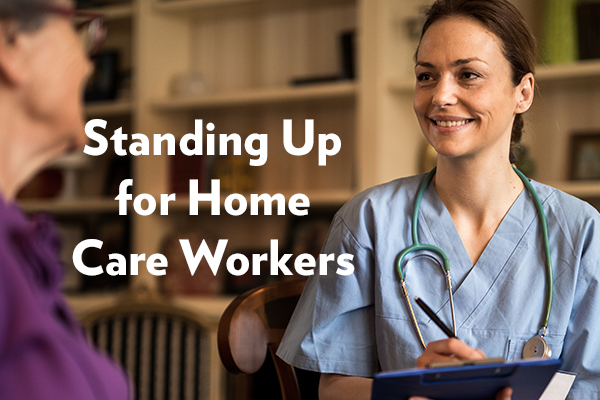Media

Union Medicaid Dues Skimming Scheme Finally Ends
Six years ago, Pam Harris fought in court to keep her disabled son at home. A portion of her limited caregiver stipend was being funneled to union she never voted to join, compromising her ability to care for her son. For more than a decade states have taken Medicaid money intended for individuals with disabilities, the sick, and the elderly—and given it to unions.
However, yesterday the Center for Medicaid Services (CMS) issued a final rule to end this scheme of skimming union dues from vulnerable populations.
Traditionally, federal law requires direct payments only to Medicaid recipients or providers, such as home care workers. However, unions increasingly targeted these workers for unionization and, in 2014, CMS reversed precedent by validating the state government practice of funneling money directly to unions (“third parties”).
As a result, an estimated $1.4 billion in Medicaid funds were sent to unions in eight states, according to a Freedom Foundation analysis of 2000-17. That’s over one billion dollars diverted from those who need it most and given to wealthy, politicized unions.
Unfortunately, dues skimming is happening in Pennsylvania too.
Shortly after taking office in 2015, Governor Wolf issued an executive order allowing union-backed United Home Care Workers (UHCW) to dictate the employment terms of roughly 20,000 home care workers. In other words, union leaders who gave nearly $4 million to Governor Wolf’s campaign could skim public healthcare funds from vulnerable Pennsylvanians.
Home care workers objected. With the help of public interest law firm, The Fairness Center, Dave Smith and his friend and home care worker Don Lambrecht sued the governor for his unwanted interference in their professional arrangement. According to Dave at the time of his lawsuit:
Let me put it this way; we make a team that works well. To have someone else come in and say we need to do it this way for this many hours—that just doesn’t work.
Their lawsuit helped stay the executive order for three years, until the state Supreme Court authorized Wolf’s executive order in 2018. Despite only 13 percent of home care workers voting for representation, UHCW began taking 2 percent of members’ wages.
This quickly paid dividends for Wolf, who received $45,000 from UHCW for his reelection.
Now, the scheme will end.
The new rule overturns the 2014 exception. Home care workers, or their employers, can still give a portion of their earnings to third parties—such as unions—but they must “cut a check.” No longer will Medicaid dollars be automatically deducted from home care workers’ paychecks and directly sent to union bank accounts.
The rule takes effect in 60 days, and requires state government to align itself with the ruling and protect Medicaid funds from abuse.
As one home care worker says, “[the] action by the Center for Medicaid Services is a big step towards giving caregivers control of their own money again.”